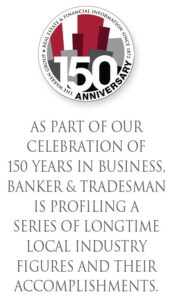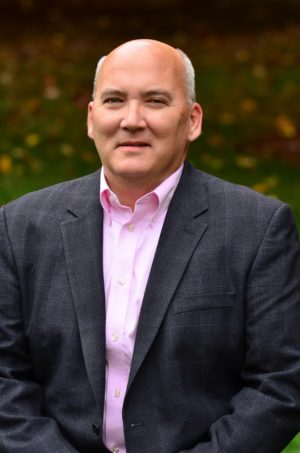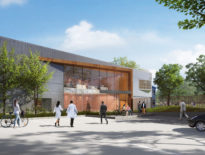James Regan
President and CEO, Digital Federal Credit Union
Age: 56
Industry experience: 30 years
As Jim Regan looks back at his long tenure leading Marlborough-based Digital Federal Credit Union, he describes one of the credit union’s big accomplishments during that time as “a relatively quiet effort.” DCU had established a charitable foundation a few years before Regan became CEO, and the foundation, DCU for Kids, has since raised more than $25 million for organizations supporting children. Regan said he was very proud of what the foundation and the credit union’s own philanthropic giving have accomplished.
Regan, who will retire at the end of July, joined DCU in January 1992 after working for Wolf & Co. as a public accountant auditing banks and credit unions. DCU, which has branches in Massachusetts and New Hampshire, is New England’s largest credit union with $9.8 billion in assets and 1 million members.
Q: What drove you to the credit union side of the financial industry?
A: Honestly, it’s where the job was available. I was looking to get out of public accounting. You learn an awful lot there, but it’s a pretty grinding lifestyle and workstyle. I was looking for another opportunity, and my wife worked at DCU, and she basically said, “Hey, there’s an opportunity here. You should look at applying.”
 When I joined the credit union, I thought that I would probably be here for about three years, gain some experience and then move on to something else. But being with the credit union and being involved in the industry, I kept liking my job. I spent 17 years here before becoming CEO, including 14 under CEO Carlo Cestra, who was a great, great mentor who gave me a lot of opportunities that I might not have gotten in other places. In January of 2009, I was fortunate enough to be selected as the CEO. It was a great opportunity, but it was also in the middle of a financial crisis. It had its pros and cons.
When I joined the credit union, I thought that I would probably be here for about three years, gain some experience and then move on to something else. But being with the credit union and being involved in the industry, I kept liking my job. I spent 17 years here before becoming CEO, including 14 under CEO Carlo Cestra, who was a great, great mentor who gave me a lot of opportunities that I might not have gotten in other places. In January of 2009, I was fortunate enough to be selected as the CEO. It was a great opportunity, but it was also in the middle of a financial crisis. It had its pros and cons.
Q: What were some of the challenges taking over during the crisis?
A: Some of the big challenges were the unknowns in the economy and the environment. Trying to help members work through a financial crisis was really the most challenging piece of it. Most people don’t have any intention of running into financial challenges when they get a mortgage with you or an auto loan or a credit card – and then things happen.
That was very hard. But when you look back at it, it was very rewarding considering how many folks we were able to help. Like everybody else, we weren’t able to help everybody as much as we would have liked. But we did everything we could to help our members get through that. I think one of the benefits to that in the long term was that people recognized that when they needed us, we were there for them.
Q: What were some of the keys to growth during your tenure?
A: It really roots itself in basically taking care of folks and being there for the members, being there for the employees and having folks that like to come to work and like their jobs. I think that came through in how we were able to help members and work with members. A huge amount of DCU’s success from back when I first started here was through word-of-mouth – folks talking to friends about the experiences they had with us. They referred family and friends and co-workers to DCU. That has been has always been – and will continue well beyond my tenure here – a major piece of our success as an organization.
Q: What are some accomplishments during your time at DCU that you might look back on?
A: I can’t take most of the credit for it; there are a lot of people that are behind the scenes that did a great job. When you think of Digital Federal Credit Union, you might think of something that is more for upscale folks or higher-earner types. One of the things that we’ve done is we’ve focused on what we define as underserved or folks that are in low- or moderate-income communities and households. That’s an area of focus that I’m really proud of: smaller loans, loans that folks need so that they don’t have to go to a payday lender or to a high-cost provider.
We’ve also been able over the years to provide a significant amount of return to our members. Since 2016, we’ve been able to return or not collect over $100 million in fees, where we’ve either reduced the cost of those fees compared to where the market is or we’ve just eliminated the fees. At the same time there’s probably another $110 million to $120 million of incentives or encouragement that we’ve provided in lower loan rates or higher savings rates.
Another thing that we’ve done that has given back to us, given back to the credit union community but also given back to the community in general is that we created a fintech center in Boston about seven years ago. There’s been over 80 startups that we’ve worked with in that center, and they’ve been successful in many different ways. They’ve gone out and raised hundreds of millions of dollars in capital or equity investments to build and provide more innovative products and services that help people in their lives.
Q: What are some of the keys for DCU to continue to grow in the coming years?
A: I believe that it’s going to continue to be an organization that focuses on our member owners – to continue to find out and identify what it is that’s important to them and do the best that we can to provide those products, services and resources that our members need in order to achieve what their financial goals are. It’s very clear our board is more than committed to that.
Q: What are your plans for retirement?
A: I don’t have any right now. I’m going to take the next three to six months to figure out what I want to do next. I don’t plan on being a full-time CEO or executive any place. It would be more part-time roles. I do have an interest in the fintech side of things, so perhaps there will be some advisory roles – maybe helping some of the younger companies by sharing perspectives that I have.







